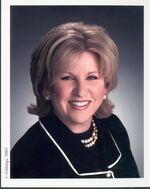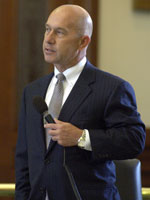Texas 2010 legislative election results
Senate
|
Alabama • Alaska • Arizona • Arkansas • California • Colorado • Connecticut • Delaware • Florida • Georgia • Hawaii • Idaho • Illinois • Indiana • Iowa • Kansas • Kentucky • Maine • Maryland • Massachusetts • Michigan• Minnesota • Missouri • Montana • Nebraska • Nevada • New Hampshire • New Mexico • New York • North Carolina • North Dakota • Ohio • Oklahoma • Oregon • Pennsylvania • Rhode Island • South Carolina • South Dakota • Tennessee • Texas • Utah • Vermont • Washington • West Virginia • Wisconsin • Wyoming |
| Other 2010 Election information |
Texas State Senate Election Results
This page contains macro-level election results and analysis for the Texas State Senate. For results in individual contests see our Texas State Senate elections, 2010 page. The following is a breakdown of the state senate before and after the election:
| Texas State Senate | |||
|---|---|---|---|
| Party | As of November 1, 2010 | After the 2010 Election | |
| Democratic Party | 12 | 12 | |
| Republican Party | 19 | 19 | |
| Total | 31 | 31 | |
What You'll See on This Page
This page displays the following lists of candidates
- Incumbents who ran on November 2
- Incumbents who were defeated
- Challengers who defeated an incumbent
- Newly elected senators
- List of all winners
- Unopposed candidates
- Third party candidates
State Senate Overview:
- There were 15 incumbents who ran in the November 2 general election. No incumbents lost, and thus 15 incumbents were re-elected to the Texas State Senate.
- There will be 1 new senator sworn-in, a Democratic candidate, Jose R. Rodriguez.
- Of the 16 seats up for election, 5 were won by Democrats and 11 by Republicans.
- 8 candidates were unopposed, 0 Democrats and 8 Republicans.
- Only 4 candidates ran as an independent or third party candidate in the general election.
Incumbency Analysis
Of the 1,167 state senate seats up for election in 2010, incumbents ran for 894 (76.6%) of them. Of these 894, 94 lost their re-election bids, 89 Democrats and 5 Republicans. In Texas, 1 incumbent senator did not run for re-election on the November 2 ballot, while 15 incumbents (93.8%) ran for re-election. All 15 won re-election.
Incumbents who ran on November 2
The following is a list of all of the incumbents who ran on the November 2 general election ballot:
Incumbents defeated
The following is a list of incumbents defeated on November 2:
No incumbents were defeated.
Challengers who beat an incumbent
The following is a list of challengers who defeated an incumbent on November 2:
No challengers defeated an incumbent.
New State Senators and General Election Winners
388 new senators were elected across the country. This includes challengers who defeated incumbents as well as candidates who won open seats. Of these 388, 278 were Republicans and 110 were Democrats. In Texas, 1 new senator will be sworn-in, Democratic candidate Jose R. Rodriguez. In total, Texas elected 16 senators, 11 Republicans and 5 Democrats.
Newly elected senators
The following is the newly-elected member of the Texas State Senate:
Democratic
Republican
No Republican challengers won election.
Open Seat Winners
The following is a list of candidates who won election in seats where no incumbent was running:
Democratic
Republican
No Republican challengers won an open seat.
Candidates who won election
The following is a list of all candidates elected to the Texas State Senate:
Democratic
Republican
Competitiveness

Across the nation, 1,167 state senate seats were up for election in 2010. 1,143 of those seats were partisan seats (24 seats were up for election in Nebraska's nonpartisan unicameral legislature). In 320 (28.0%) of these state senate contests, there was a major party candidate with no major party opposition. In Texas, 12 candidates (24.0% of seats) faced no major party opposition. Of these 12, 1 was a Democrat and 11 were Republicans.
Unopposed candidates in general election
The following candidates did not face major party competition:
Democratic
All Democratic candidates faced a Republican opponent.
Republican
Ballot Access
Across the nation, 140 independent or third party candidates ran for state senate. In Texas, 8 (25%) of the 32 senate candidates ran as an independent or third party candidate. None won election in the November 2 general election.
Third party candidates
The following is a list of third party and independent candidates who ran in 2010:
House
|
Alabama • Alaska • Arizona • Arkansas • California • Colorado • Connecticut • Delaware • Florida • Georgia • Hawaii • Idaho • Illinois • Indiana • Iowa • Kansas • Kentucky • Maine • Maryland • Massachusetts • Michigan• Minnesota • Missouri • Montana • Nebraska • Nevada • New Hampshire • New Mexico • New York • North Carolina • North Dakota • Ohio • Oklahoma • Oregon • Pennsylvania • Rhode Island • South Carolina • South Dakota • Tennessee • Texas • Utah • Vermont • Washington • West Virginia • Wisconsin • Wyoming |
| Other 2010 Election information |
Texas State House Election Results
This page contains macro-level election results and analysis for the Texas House of Representatives. For results in individual contests, see our Texas House of Representatives elections, 2010. The following is a breakdown of the state house before and after the election:
| Texas House of Representatives | |||
|---|---|---|---|
| Party | As of November 1, 2010 | After the 2010 Election | |
| Democratic Party | 73 | 51 | |
| Republican Party | 76 | 98 | |
| Vacancy | 1 | 1 | |
| Total | 150 | 150 | |
What You'll See on This Page
This page displays the following lists of candidates
- Incumbents who ran on November 2
- Incumbents who were defeated
- Challengers who defeated an incumbent
- Newly elected senators
- List of all winners
- Unopposed candidates
- Third party candidates
State House Overview:
- There were 137 incumbents who ran in the November 2 general election. Only 20 incumbents lost, and thus 116 incumbents were re-elected to the Texas House of Representatives.
- No Republican incumbents lost in the general election, while 20 incumbent Democratic incumbent lost.
- There will be 34 new representatives sworn-in. Of those 35, 4 are Democrats and 30 are Republicans
- Of the 150 seats up for election, 51 were won by Democrats and 99 by Republicans.
- 91 candidates were unopposed, 37 Democrats and 54 Republicans.
- Only 5 candidates ran as an independent or third party candidate in the general election.
Incumbency Analysis
Of the 4,958 state house seats up for election, incumbents ran in the general election for 4,091 (79.5%) of them. Of these 4,091 incumbents, 413 lost their re-election bids, 403 Democrats and 10 Republicans. In Texas, 137 (91.3%) incumbents ran for re-election. Of these 137, 20 incumbent representatives were defeated. All 20 incumbents were Democrats.
Incumbents who ran on November 2
The following is a list of all of the incumbents who ran on the November 2 general election ballot:
- Mark Homer
- Edmund Kuempel
- Stephen Frost
- Bryan Hughes
- Leo Berman
- Byron Cook
- Jim Pitts
- Chuck Hopson
- Jim McReynolds
- Lois Kolkhorst
- Fred Brown (Texas)
- Brandon Creighton
- Tim Kleinschmidt
- John Otto
- Mike Hamilton
- Allan Ritter
- Joe Deshotel
- Craig Eiland
- Dennis Bonnen
- Charlie Howard
- John Zerwas
- Randy Weber
- Geanie Morrison
- Ryan Guillen
- Todd Hunter
- Solomon Ortiz, Jr.
- Abel Herrero
- Yvonne Gonzalez Toureilles
- Rene Oliveira
- Armando Martinez (Texas)
- Veronica Gonzales
- Richard Raymond
- Patrick Rose
- Donna Howard
- Mark Strama
- Eddie Rodriguez
- Diana Maldonado
- Jimmie Don Aycock
- Ralph Sheffield
- Charles Anderson (Texas)
- Jim Dunnam
- Rob Orr
- Sid Miller
- Jim Keffer
- Phil King (Texas)
- Larry Phillips (Texas)
- Tan Parker
- Myra Crownover
- Burt Solomons
- Van Taylor
- Jerry Madden
- Rick Hardcastle
- Susan King
- Drew Darby
- Doug Miller (Texas)
- Pete Gallego
- Chente Quintanilla
- Marisa Marquez
- Joseph Moody
- Joe Pickett
- Tracy King
- Tryon Lewis
- Tom Craddick
- Joe Heflin
- John Smithee
- Warren Chisum
- Jodie Laubenberg
- Lon Burnam
- Todd Smith, Texas Representative
- Paula Pierson
- Diane Patrick
- Marc Veasey
- Chris Turner (Texas)
- Mark Shelton
- Vicki Truitt
- Charlie Geren
- Robert Miklos
- Carol Kent (Texas)
- Rafael Anchia
- Linda Harper-Brown
- Kirk England
- Allen Vaught
- Dan Branch
- Helen Giddings
- Yvonne Davis
- Angie Chen Button
- Joe Driver
- Will Ford Hartnett
- Jim Jackson (Texas)
- Trey Martinez Fischer
- David McQuade Leibowitz
- Joe Farias
- Roland Gutierrez
- Ruth Jones McClendon
- Joe Straus
- José Menéndez
- Joaquin Castro
- Patricia Harless
- Wayne Smith (Texas)
- John Davis (Texas)
- Allen Fletcher
- Alma Allen
- William Callegari
- Kristi Thibaut
- Ellen Cohen
- Gary Elkins
- Beverly Woolley
- Dwayne Bohac
- Sylvester Turner
- Armando Walle
- Senfronia Thompson
- Harold Dutton Jr.
- Ken Legler
- Carol Alvarado
- Borris Miles
- Jessica Farrar
- Hubert Vo
- Debbie Riddle
- Rob Eissler
- Ana Hernandez (Texas)
- Elliott Naishtat
- Ken Paxton
- Larry Taylor (Texas)
- Dan Flynn
- Scott Hochberg
- Eddie Lucio III
- Dawnna Dukes
- Roberto Alonzo
- Harvey Hilderbran
- Garnet Coleman
- Eric Johnson (Texas)
- Wayne Christian (Texas state executive)
Incumbents defeated
The following is a list of incumbents defeated on November 2:
Challengers who beat an incumbent

The following is a list of challengers who defeated an incumbent on November 2:

New Representatives and General Election Winners
1,345 new representatives were elected across the country. This includes challengers who defeated incumbents as well as candidates who won open seats. Of these 1,345, 988 were Republicans and 357 were Democrats. In Texas, 34 new representatives will be sworn-in. Of those 34, 4 are Democrats and 30 are Republicans. In the 12 open seat contests, Republicans won 4 and Democrats 8. In total, Texas elected 150 representatives, 99 Republicans and 51 Democrats.
Newly elected representatives
The following are the newly-elected members of the Texas House of Representatives:
Democratic
Republican
- George Lavender
- Erwin Cain
- David Simpson (Texas)
- James White (Texas representative)
- Charles Schwertner
- Raul Torres
- Connie Scott
- Jose Aliseda
- Paul Workman
- Larry Gonzales
- Marva Beck
- Lanham Lyne
- Donald Margo
- Charles Perry
- John Frullo
- Jim Landtroop
- Four Price
- Barbara Nash
- Bill Zedler
- Stefani Carter
- Rodney Anderson (Texas)
- John Garza
- Lyle Larson
- Dan Huberty
- Jim Murphy (Texas)
- Sarah Davis (Texas)
- Cindy Burkett
- Lance Gooden
- Jason Isaac
- Kenneth Sheets
Open Seat Winners
The following is a list of candidates who won election in seats where no incumbent was running:
Democratic
Republican
Candidates who won election
The following is a list of all candidates elected to the Texas House of Representatives:
Democratic
- Joe Deshotel
- Craig Eiland
- Ryan Guillen
- Sergio Munoz Jr.
- Rene Oliveira
- Armando Martinez (Texas)
- Veronica Gonzales
- Richard Raymond
- Donna Howard
- Mark Strama
- Eddie Rodriguez
- Pete Gallego
- Chente Quintanilla
- Marisa Marquez
- Joe Pickett
- Tracy King
- Lon Burnam
- Marc Veasey
- Rafael Anchia
- Helen Giddings
- Yvonne Davis
- Trey Martinez Fischer
- Joe Farias
- Roland Gutierrez
- Ruth Jones McClendon
- José Menéndez
- Alma Allen
- Sylvester Turner
- Armando Walle
- Senfronia Thompson
- Harold Dutton Jr.
- Carol Alvarado
- Borris Miles
- Jessica Farrar
- Joaquin Castro
- Hubert Vo
- Naomi Gonzalez
- Ron Reynolds
- Aaron Pena, 2010
- Ana Hernandez (Texas)
- Elliott Naishtat
- Scott Hochberg
- Eddie Lucio III
- Dawnna Dukes
- Roberto Alonzo
- Garnet Coleman
- Eric Johnson (Texas)
Republican
- Edmund Kuempel
- George Lavender
- Erwin Cain
- Bryan Hughes
- Leo Berman
- David Simpson (Texas)
- Byron Cook
- Jim Pitts
- Chuck Hopson
- James White (Texas representative)
- Lois Kolkhorst
- Fred Brown (Texas)
- Brandon Creighton
- Tim Kleinschmidt
- John Otto
- Mike Hamilton
- Charles Schwertner
- Allan Ritter
- Dennis Bonnen
- Charlie Howard
- John Zerwas
- Randy Weber
- Geanie Morrison
- Ryan Guillen
- Todd Hunter
- Raul Torres
- Connie Scott
- Jose Aliseda
- Paul Workman
- Larry Gonzales
- Jimmie Don Aycock
- Ralph Sheffield
- Charles Anderson (Texas)
- Marva Beck
- Rob Orr
- Sid Miller
- Jim Keffer
- Phil King (Texas)
- Larry Phillips (Texas)
- Tan Parker
- Myra Crownover
- Burt Solomons
- Van Taylor
- Jerry Madden
- Rick Hardcastle
- Lanham Lyne
- Susan King
- Drew Darby
- Doug Miller (Texas)
- Donald Margo
- Tryon Lewis
- Tom Craddick
- Charles Perry
- John Frullo
- Jim Landtroop
- John Smithee
- Four Price
- Warren Chisum
- Jodie Laubenberg
- Todd Smith, Texas Representative
- Barbara Nash
- Diane Patrick
- Bill Zedler
- Mark Shelton
- Vicki Truitt
- Charlie Geren
- Stefani Carter
- Linda Harper-Brown
- Rodney Anderson (Texas)
- Dan Branch
- Angie Chen Button
- Joe Driver
- Will Ford Hartnett
- Jim Jackson (Texas)
- John Garza
- Joe Straus
- Lyle Larson
- Patricia Harless
- Dan Huberty
- Wayne Smith (Texas)
- John Davis (Texas)
- Allen Fletcher
- William Callegari
- Jim Murphy (Texas)
- Sarah Davis (Texas)
- Gary Elkins
- Beverly Woolley
- Dwayne Bohac
- Ken Legler
- Debbie Riddle
- Rob Eissler
- Ken Paxton
- Larry Taylor (Texas)
- Dan Flynn
- Cindy Burkett
- Lance Gooden
- Jason Isaac
- Kenneth Sheets
- Harvey Hilderbran
- Wayne Christian (Texas state executive)
Competitiveness
Across the nation, 4,958 state house seats were up for election in 2010. In 1,680 (33.9%) of these state house contests, there was a major party candidate with no major party opposition. In Texas, 91 candidates (60.7% of all seats) faced no major party opposition. Of these 91, 37 were Democrats and 54 were Republicans.
Unopposed candidates in general election
The following candidates did not face major party competition:
Democratic

- Yvonne Davis
- Ruth Jones McClendon
- José Menéndez
- Ryan Guillen
- Alma Allen
- Armando Martinez (Texas)
- Armando Walle
- Borris Miles
- Carol Alvarado
- Chente Quintanilla
- Harold Dutton Jr.
- Helen Giddings
- Joaquin Castro
- Joe Farias
- Joe Deshotel
- Joe Pickett
- Marc Veasey
- Marisa Marquez
- Rafael Anchia
- Rene Oliveira
- Richard Raymond
- Sergio Munoz Jr.
- Sylvester Turner
- Tracy King
- Trey Martinez Fischer
- Ron Reynolds
- Aaron Pena, 2010
- Elliott Naishtat
- Eddie Lucio III
- Dawnna Dukes
- Roberto Alonzo
- Garnet Coleman
- Eric Johnson (Texas)
Republican
- Allen Fletcher
- Doug Miller (Texas)
- Angie Chen Button
- Todd Hunter
- Beverly Woolley
- Brandon Creighton
- Bryan Hughes
- Burt Solomons
- Charles Perry
- Charles Schwertner
- Charlie Geren
- Van Taylor
- Jerry Madden
- David Simpson (Texas)
- Dennis Bonnen
- Diane Patrick
- Drew Darby
- Fred Brown (Texas)
- Geanie Morrison
- Gary Elkins
- Jim Pitts
- Jim Keffer
- Jim Jackson (Texas)
- Jimmie Don Aycock
- Jodie Laubenberg
- Ralph Sheffield
- Joe Straus
- John Otto
- John Smithee
- John Davis (Texas)
- Larry Phillips (Texas)
- Leo Berman
- Lois Kolkhorst
- Mark Shelton
- Mike Hamilton
- Myra Crownover
- Phil King (Texas)
- Randy Weber
- Rick Hardcastle
- Sid Miller
- Tom Craddick
- Susan King
- Tan Parker
- Vicki Truitt
- Tryon Lewis
- Warren Chisum
- Wayne Smith (Texas)
- Ryan Guillen
- Allan Ritter
- Rob Eissler
- Ken Paxton
- Larry Taylor (Texas)
- Dan Flynn
- Lance Gooden
- Harvey Hilderbran
Ballot Access
In Texas, 67 (24.5%) of the 273 house candidates ran as independent or third party candidates.
Third party candidates
The following is a list of third party and independent candidates who ran in 2010:
National Partisan Trends
|
Alabama • Alaska • Arizona • Arkansas • California • Colorado • Connecticut • Delaware • Florida • Georgia • Hawaii • Idaho • Illinois • Indiana • Iowa • Kansas • Kentucky • Maine • Maryland • Massachusetts • Michigan• Minnesota • Missouri • Montana • Nebraska • Nevada • New Hampshire • New Mexico • New York • North Carolina • North Dakota • Ohio • Oklahoma • Oregon • Pennsylvania • Rhode Island • South Carolina • South Dakota • Tennessee • Texas • Utah • Vermont • Washington • West Virginia • Wisconsin • Wyoming |
| Other 2010 Election information |
National Partisan Trends
The following tables detail the partisan breakdown of national election results. These results provide context for Republican gains in Texas.
Incumbents who were defeated in the general election
Across the nation, only 15 Republican incumbents were defeated while 492 Democratic incumbents were defeated. In total, 507 (10.4%) of the 4,872 incumbents running in the general election were defeated. The following is a breakdown of incumbent defeats in the 2010 general election:
The following is the breakdown of incumbents who lost.
| Incumbents defeated in 2010 legislative elections | |||
|---|---|---|---|
| Party | Senate | House | Total |
| Democratic | 89 | 403 | 492 |
| Republican | 5 | 10 | 15 |
| TOTALS | 94 | 413 | 507 |
Total new legislators elected
In total, 1,733 (28.3%) new legislators were elected in 2010. Of these 1,733, 1,266 (73.1%) are Republicans and 467 (26.9%) are Democrats.
The following is the breakdown of new legislators.
| New Legislators after the 2010 legislative elections | |||
|---|---|---|---|
| Party | Senate | House | Total |
| Democratic | 110 | 357 | 467 |
| Republican | 278 | 988 | 1,266 |
| TOTALS | 388 | 1,345 | 1,733 |
Winners of Open Seats
Open seats contests made up 1,178 (19.2%) of the 6,125 seats on November 2. Of these 1,178 open seats, Republicans won 729 (61.9%) while Democrats won 449 (38.1%). Going into the election, the number of open seats formerly held by each party was quite similar. Estimates prior to the election suggest that approximately 52% of the open seats were previously held by Republicans and 48% were held by Democrats.
The following is the breakdown of open seat winners.
| Open Seat Winners in 2010 legislative elections | |||
|---|---|---|---|
| Party | Senate | House | Total |
| Democratic | 108 | 341 | 449 |
| Republican | 191 | 538 | 729 |
| TOTALS | 299 | 879 | 1,178 |
Impact on legislative majorities
- See also: Partisan balance of state legislatures
Heading into the November 2 elections, the Democratic Party held a commanding lead in state houses in the 88 legislative chambers that held elections in 2010. 52 of the 88 chambers, or nearly 60% of them, had a Democratic majority, while only 33 of them had a Republican majority. (Two chambers had an exactly equal number of Democrats and Republicans and one is officially nonpartisan.) The following is a partisan breakdown of state legislatures prior to the November 2 election:
| Partisan breakdown before the November 2010 Election | ||||
|---|---|---|---|---|
| Legislative chamber | ||||
| State senates | 23 | 18 | 1 | 1 |
| State houses | 29 | 15 | 1 | - |
| Totals: | 52 | 33 | 2 | 1 |
As a result of the election, Republicans picked up 20 legislative chambers while Democrats lost 20. Republicans won 53 total chambers on November 2, while Democrats won only 32. The following is a partisan breakdown of state legislatures after the November 2 election:
| Partisan breakdown after the November 2010 Election | ||||
|---|---|---|---|---|
| Legislative chamber | ||||
| State senates | 16 | 25 | 1 | 1 |
| State houses | 16 | 28 | 1 | 0 |
| Totals: | 32 | 53 | 2 | 1 |
Another way to examine the data is to gauge how many chambers had gains for the Democratic Party versus the Republican Party. Using this variable, the wide-sweeping Republican victory is further amplified. Democrats bolstered their majorities in only 7 of 88 (7.96%) state chambers. These legislatures are as follows:
| State legislative chambers where Democrats gained seats on November 2 | ||
|---|---|---|
| State | Chamber | Number of seats gained by Democrats |
| California | Assembly | + 2 |
| Delaware | House | + 2 |
| Hawaii | Senate | + 1 |
| Maryland | Senate | + 2 |
| Massachusetts | Senate | + 1 |
| Missouri | Senate | + 1 |
| West Virginia | Senate | + 1 |
In 7 chambers, the GOP kept their current number of seats. In one chamber, the California State Assembly, both major parties gained seats by filling 2 vacancies and defeating an incumbent independent. Overall, the Republican Party picked up legislative seats in 75 (85.2%) of the 88 legislative chambers that held elections on November 2.
Impact on State Politics
Along with the GOP capture of the U.S. House of Representatives, state Republicans gained trifectas (control of the governorship, house, and senate) in 12 states. The following is a breakdown of trifectas across the nation, before and after the 2010 election:
| Trifectas before and after the 2010 Election | ||||||
|---|---|---|---|---|---|---|
| Party | Before election | U.S. House seats | After election | U.S. House seats | Gain/loss states | Gain/loss congressional seats |
| 16 | 131 | 11 | 115 | -5 | -16 | |
| 8 | 66 | 20 | 198 | +12 | +132 | |
Before the election, 131 U.S House seats were in states with Democratic trifectas, while 66 districts were in states with Republican trifectas. After the election, Republicans trifectas control redistricting for 198 U.S. House seats while Democrats control only 115. Additionally, California, the strongest Democratic trifecta with 53 U.S. House representatives, passed propositions that take redistricting power away from state government.
Texas








